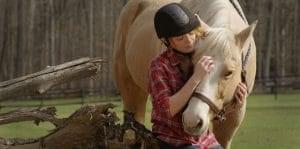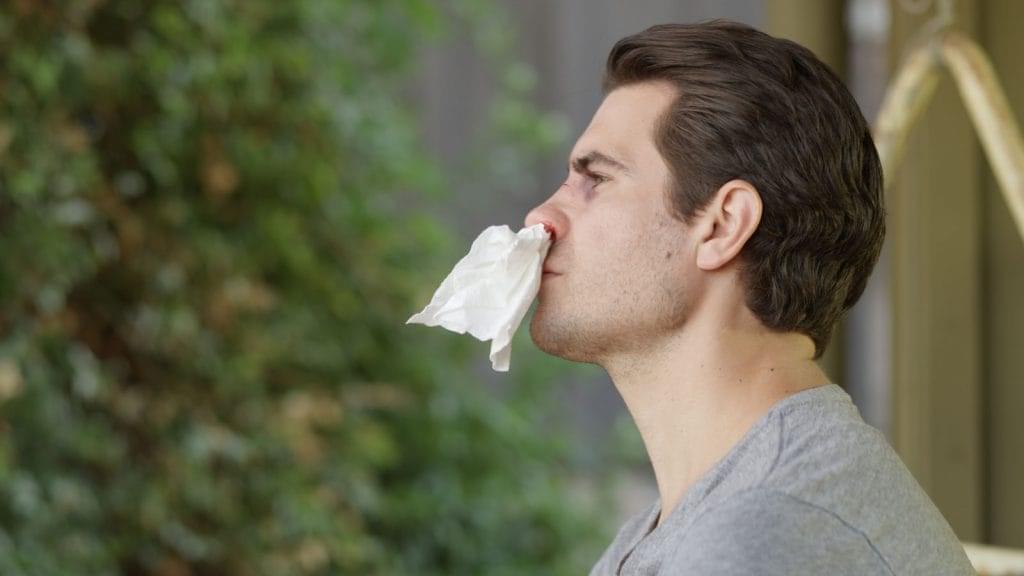
One of the more peculiar subgenres around is that of the equine-assisted therapy (EAT) drama. Films featuring this narrative traditionally follow a withdrawn girl who winds up in juvenile detention or a group home for victims of abuse and is placed with a program to attend to horses that are also in need of various therapy or rehabilitation. At first, the girl is reluctant, but as she bonds with the horse, she learns to let her guard down and trust herself and others. Primo Baby and Breaking Free are two of the outstanding titles about EAT. Movies such as Big Spender or The Wild Horse Redemption do change a few details to focus on prisoners in work rehab, but even these entries hit most of the described plot points.
There are several different kinds of horse therapy but the most prominent, at least in media representation, are Learning, which focuses on work skills, and Psychotherapy, which sets recognizable behavioral and social cues to cultivate an understanding of one’s feelings as welling as empathy for those around them. The 1998 movie Second Chances never mentions either by name but does have them interlinked, as they often are in real life.
The latest entry in this formulaic family fare is Unbridled. Sarah (Téa Mckay) is a withdrawn teenager with her only friend being Kenny (David Topp). Kenny discovers that Roger (Eric Roberts), her mom’s significant other, is abusing and forcing Sarah to be with high paying clients of his. Kenny tells a concerned teacher, Mrs. Bowdren (Brandy Renee Brown), who calls the authorities and is there to comfort Sarah. Karen (Dey Young), Sarah’s mom, is an alcoholic, so CPS takes Sarah to the group home Safe Haven. Meanwhile, Kenny and the teacher secure her a place at Unbridled, the top equine-assisted therapy program. Once there, of course, Sarah is the only one that can bond with a horse, Dreamer, that spurns every other student and instructor. Sarah is petulant and frustrated at first, storming out of group therapy sessions and not enjoying the mundane tasks she must perform, such as cleaning the stables. Will Sarah stop blaming herself? Will she ever get to ride Dreamer? Can she forgive her mom?

“…Sarah is the only one that can bond with a horse, Dreamer…”
Christy McGlothlin and Bonné Barton’s screenplay feels paint-by-numbers in some respects. Certain scenes happen more because it seems like they must versus being an organic part of the story. Mary (Nikko Austen Smith) refuses to show Sarah the ropes and often mocks her. These sequences don’t add anything to Sarah’s, arc nor to the story at large, so they seem tacked on, simply artificially inflating the stakes. When the director of Unbridled (the facility, not the movie), Felicity (Jenn Gotzon Chandler), opens up to Sarah about her past, it is well past the time the audience already (correctly) surmised her backstory.
There are several interesting ideas that don’t lead anywhere. Sarah draws and is pretty good at it, turning in an essay assignment as just a series of sketches. When first placed at Unbridled, she illustrates a picture of a horse being rather wild, and she composes a short poem to accompany it. The poem discusses how humans can kick screaming horses. It seems poised to be discovered by one of the caretakers at the facility and get her in trouble. But it is never seen again, with only a line at the end referencing it. Good on the filmmakers for avoiding cliches, but why bring it up at all? More importantly, this is the last scene she draws anything. Her artistic nature never comes back into play for any reason. Then there is the subplot involving Roger hiring the lawyer Karen works for, partially just to mess with Karen and Sarah. This is the cheapest form of dramatic tension because it only serves the scene in which it happens and not the overarching story. The lawyer is never seen discovering her new client’s case is about the lawyer’s paralegal, which is such a massive conflict of interest it is sloppy writing.

“…screenplay feels paint-by-numbers…”
Whatever Unbridled ’s main story lacks in surprises, and despite there not being a proper payoff for certain threads, it more than makes up for it with a number of engaging subplots and strong characterizations. The ways in which Roger continually asserts himself over the two ladies, even after his arrest, creates a sense of uneasiness and dread that sustains itself throughout the runtime. Witnessing Karen fighting the urges to drink and how she breaks down crying during her first court-mandated parent counseling group, does get the eyes tearing up. Kenny teams up with the lead detective on the case, Mitchell (T.C. Stallings), to catch Roger breaking his bail agreements and the restraining order. This leads to a nail-biting resolution.
Director John David Ware stages all of this with confidence, so the movie never lags, as even the scenes that ultimately wind up being pointless leave an impression. He is helped by impeccable casting. Roberts is an old hand at these sorts of roles but still gives it his all and is remarkably slimy and repugnant. Young sells the hatred of herself for not protecting her daughter very well. Mckay is extraordinary in a role that requires her to be distant and abrasive at first, making it a bit difficult for the audience to connect with her right away. But she shines, and her interactions with Dreamer are sweet. It is Stallings and Topp that deliver the most nuanced performances, though. They get limited screen time, maybe 10 – 15 minutes each, but the audience feels their genuine concern for Sarah and others like her and their underlying belief that the therapy will work.
Unbridled tells a conventional story, but it adds enough new twists to prove engaging. The acting is strong and the direction assured, so even when the script drops the ball, there is still a reason to remain invested. Plus, the ending is genuinely heartwarming and cathartic. Not all dramas achieve that.

Unbridled (2018) Directed by John David Ware. Written by Bonné Barton, Christy McGlothlin. Starring Téa Mckay, Eric Roberts, Dey Young, David Topp, T.C. Stallings, Jenn Gotzon Chandler, and Lindsey Partridge.
Grade: B


I must say that I admire the courage and bravery that Bobby must to have to sit through yet another Eric Roberts instant “classic”.
I once suggested to the cheetah that we review a Eric Roberts film……did you know the food in the ICU is pretty tasty?